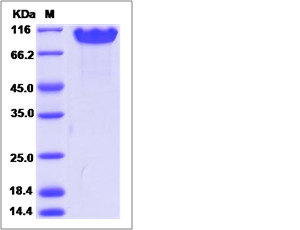Human NCAM1 / CD56 Protein (ECD, His Tag)
CD56,MSK39,NCAM
- 100ug (NPP1664) Please inquiry
| Catalog Number | P10673-H08H |
|---|---|
| Organism Species | Human |
| Host | Human Cells |
| Synonyms | CD56,MSK39,NCAM |
| Molecular Weight | The recombinant human NCAM1 consists 595 amino acids and predicts a molecular mass of 66.1 kDa. |
| predicted N | Leu 20 |
| SDS-PAGE |  |
| Purity | > 95 % as determined by SDS-PAGE. |
| Protein Construction | A DNA sequence encoding the human NCAM1 (NP_001070150.1) (Met1-Pro603) was expressed with a polyhistidine tag at the C-terminus. |
| Bio-activity | |
| Research Area | Cancer |Invasion microenvironment |Angiogenesis |Cytokine & Receptor |Transforming Growth Factor Beta (TGF-beta) Superfamily |TGF-beta Superfamily Receptors | |
| Formulation | Lyophilized from sterile PBS, pH 7.4. 1. Normally 5 % - 8 % trehalose and mannitol are added as protectants before lyophilization. Specific concentrations are included in the hardcopy of COA. |
| Background | NCAM1, also known as CD56, is a neural adhesion protein (NCAM) which belongs to the immunoglobulin superfamily. NCAM is involved in neural development and in plasticity in the adult brain. UCHL1 is a novel interaction partner of both NCAM isoforms that regulates their ubiquitination and intracellular trafficking. NCAM1 is a cell adhesion molecule involved in neuron-neuron adhesion, neurite fasciculation, outgrowth of neurites, etc. NCAM1 has also been shown to be involved in the expansion of T cells and dendritic cells which play an important role in immune surveillance. |
| Reference |
